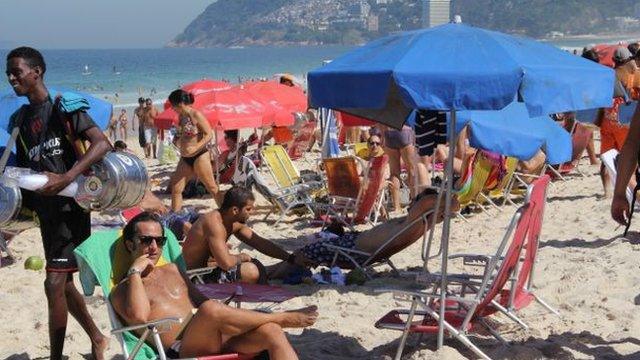Rio de Janeiro games: One thousand days and counting
- Published
The BBC's Wyre Davies has been given access to the construction site of the Olympic Park in Rio de Janeiro to see how work is currently progressing
If anyone in Rio de Janeiro is belatedly regretting accepting the enormous challenge of hosting two major global sporting events in the space of two years they're not showing it.
Much of the media and political attention of late has concentrated on next year's FIFA World Cup - an event being hosted, of course, by Brazil as a nation but where much of the focus is on Rio, the country's former capital and iconic coastal city.
The anti-government protests, the much highlighted problems and delays with stadiums and the soaring cost of putting on the event have all focused minds on the World Cup, so much so that we almost forgot two years later an even bigger jamboree comes to town - the Olympic and Paralympic Games.
The clock is counting down and there are only one thousand days to go. It's not long and it feels even less when you visit Rio's main Olympic venue at Barra, just a few kilometres to the south of the city.
Balloon venues
A huge mural on the wall at the site shows what it is meant to look like in 2016 - several brand new stadia for handball, swimming, cycling, gymnastics and so on skirting a lagoon and all part of one big, environmentally friendly, sustainable pedestrianised park.
Avert your gaze slightly to the right, away from the mural, and it's clear the only sport that could conceivably take place on the site now is mud-wrestling.
It takes a real visionary to perceive how this dirty, wet, reclaimed area of 1.18 million sq m will be transformed by the middle of 2015 - a year before the Olympics, but when many test events are due to take place in each sporting discipline.
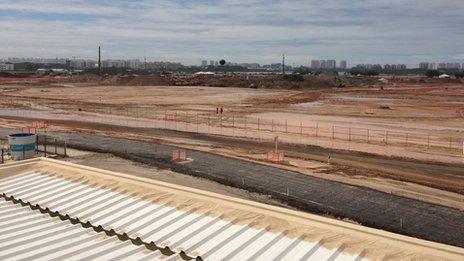
Rio will host four Olympic sites in total including the one at Barra
For now, large, coloured balloons flying above the building site give the only indication of what is to come. The gold balloon represents the swimming pool, the black balloon the handball arena and so on.
But few people here seem worried. Certainly not the local politicians touring the park as part of a relatively low-key ceremony to mark the 1,000 days nor the professionals from the local organising committee and those seconded foreign experts who've done all of this before in London, Beijing and Sydney.
Only half of the 28 Olympic and 22 Paralympic events are actually taking place here at the Olympic Park.
Rio is sensibly making the most of its iconic geography, so most water-based competition will happen in the shadow of Sugar Loaf mountain and the city-centre lake that is watched over by the statue of Christ the Redeemer.
Even the city-centre Samba-drome, home to Rio's annual carnival parades, will play host to archery and the marathons.
There will be four different general "centres" of competition based around the city for 2016.
Public transport headache
Getting that right is where much of the real work lies between now and the opening ceremony at the already redeveloped Maracana stadium.
Because, like many cities in the developing world that have grown quickly, organically and almost haphazardly, Rio has a major problem. Chaotic transport.
Travelling between different venues is already a time-consuming nightmare. The few miles between Rio's main hotel zone (the famous beaches of Copacabana, Ipanema and Flamengo) and the Olympic Park can literally take hours to negotiate.
A dedicated Olympic bus lane, the BRT, will alleviate some of the problems and in that area at least work does seem to be progressing.
A critical extension of Rio's limited but vital underground metro system is also well underway but some officials these week seemed evasive about exactly when it would be completed.
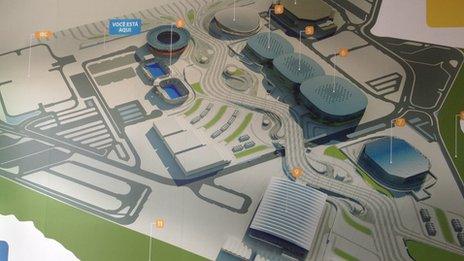
Half of the events will take place in the Olympic Park south of Rio de Janeiro
It is in a reporter's instinct to be sceptical about the problems that lie ahead and in the instinct of the public relations people to play down those issues. The truth, as ever, lies somewhere in between.
There are other critical issues to overcome, including attempts by the city to evict shantytown dwellers who live too close to the Olympic Park for the liking of some.
City and state authorities will be praying that the huge demonstrations that could very well disrupt next year's World Cup should have been resolved by 2016 and that the "feel-good" economic factor may also have returned to this vast nation.
Rio de Janeiro is a wonderful place, one of the World's great iconic cities and therefore a deserving Olympic venue.
These will also be the first Olympic and Paralympic games to be held in South America and everyone here is anxious they will succeed.
London, as an inclusive, happy games will be a difficult act to follow, just as Beijing set the standard for great facilities where no expense was spared.
While Rio is learning from others who have gone before, especially London where thousands of local and international volunteers contributed so much to the Games' running, 2016 will bring a distinctive Latin American feel.
But the transport does need sorting out.
- Published21 August 2013
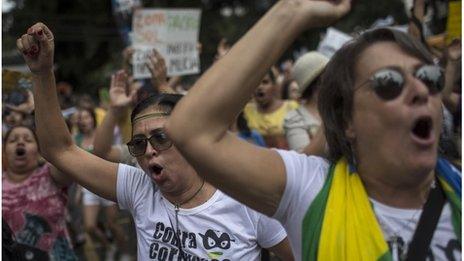
- Published8 June 2013
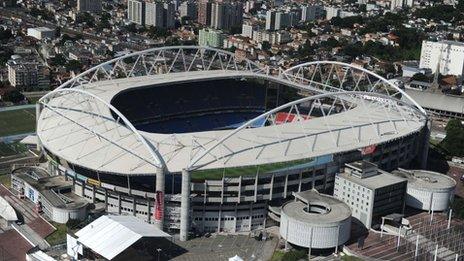
- Published13 August 2012
